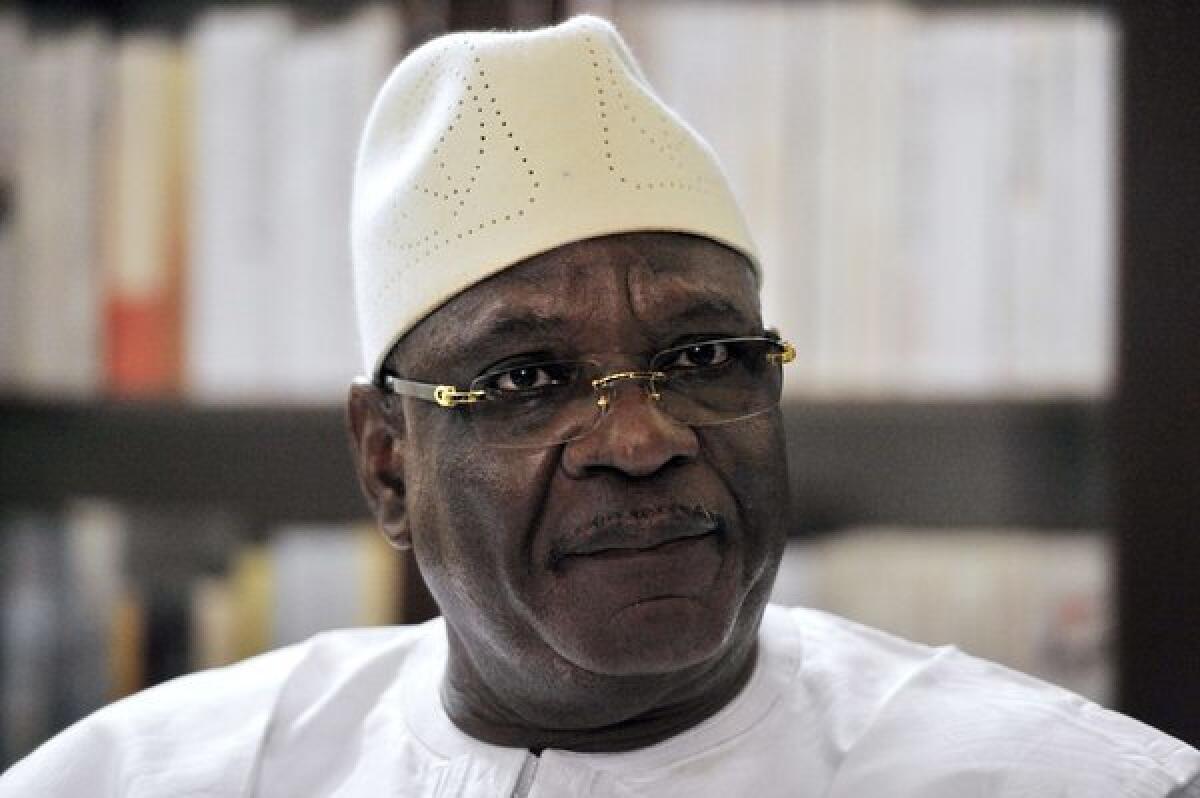Keita wins Mali presidential election after rival concedes defeat

- Share via
JOHANNESBURG, South Africa -- Ibrahim Boubacar Keita won Mali’s presidential election after his rival, Soumaila Cisse, conceded defeat late Monday.
Cisse visited Keita at his home late Monday to congratulate him, later announcing he had done so on Twitter.
“My family and I went and congratulated Mr. Keita, the future president of Mali, on his victory. May God bless Mali,” Cisse, a former finance minister tweeted.
Cisse’s concession of defeat averts the possibility of a disputed result and opens the way for donors to provide $4 billion of promised aid to rebuild the country. It’s hoped the massive aid injection -- along with a 12,600-strong United Nations peacekeeping force -- will enable the country to rebuild and will prevent the resurgence of Al Qaeda-linked militias who took over half the country last year.
U.S. State Department spokeswoman Marie Harf indicated that aid from Washington would likely resume after the successful completion of the election.
“We’ve made clear that following the return of a democratically elected government we will seek to normalize our foreign assistance to Mali,” Harf told reporters in Washington.
Keita, 68, a former prime minister known as IBK, won 40% of the vote in the first round of the election, to Cisse’s 19%, and built a strong alliance going into Sunday’s second round of voting, with several major competitors joining his camp.
Keita has a reputation for being tough on security issues, which turned out to be a plus after Tuareg rebels in the north launched a rebellion early in 2012, flooding back into the country from Libya and bringing an arsenal of sophisticated arms as Libyan rebels took power in that country.
The Tuareg rebels outgunned Mali’s military, triggering a coup that in turn allowed the rebels to take advantage of the power vacuum to seize the northern half of the country. However, violent Al Qaeda-linked militias swiftly outflanked the Tuareg rebels and took control in major northern towns, imposing a severe form of sharia law, lashing women in public, burning important manuscripts, destroying ancient tombs and punishing alleged thieves with limb amputations.
France intervened in January, driving the militias out of the major towns and killing several top regional Al Qaeda figures. The French are withdrawing their forces, as the UN force takes over security.
The Tuaregs, widely blamed in the southern capital of Bamako for the loss of the north of the country, remain in control of the northern town of Kidal, close to the border with Algeria. Under the terms of a peace deal, Mali’s military now occupies the town in an uneasy power-sharing arrangement with Tuareg leaders.
One of Keita’s difficult tasks will be to resolve the standoff and smooth over the longstanding resentment among Tuaregs that has led to repeated rebellions over many decades.
Cisse alleged widespread fraud in the first round of voting late last month, but African Union and European Union observers praised the election as free, peaceful and transparent.
ALSO:
Islamic militants suspected in deaths of 44 at Nigerian mosque
Rome mayor plans to remove Colosseum road built by Mussolini
Slain businessman Neil Heywood’s family seeks damages in China murder case
Twitter: @latimesdixon
More to Read
Sign up for Essential California
The most important California stories and recommendations in your inbox every morning.
You may occasionally receive promotional content from the Los Angeles Times.










